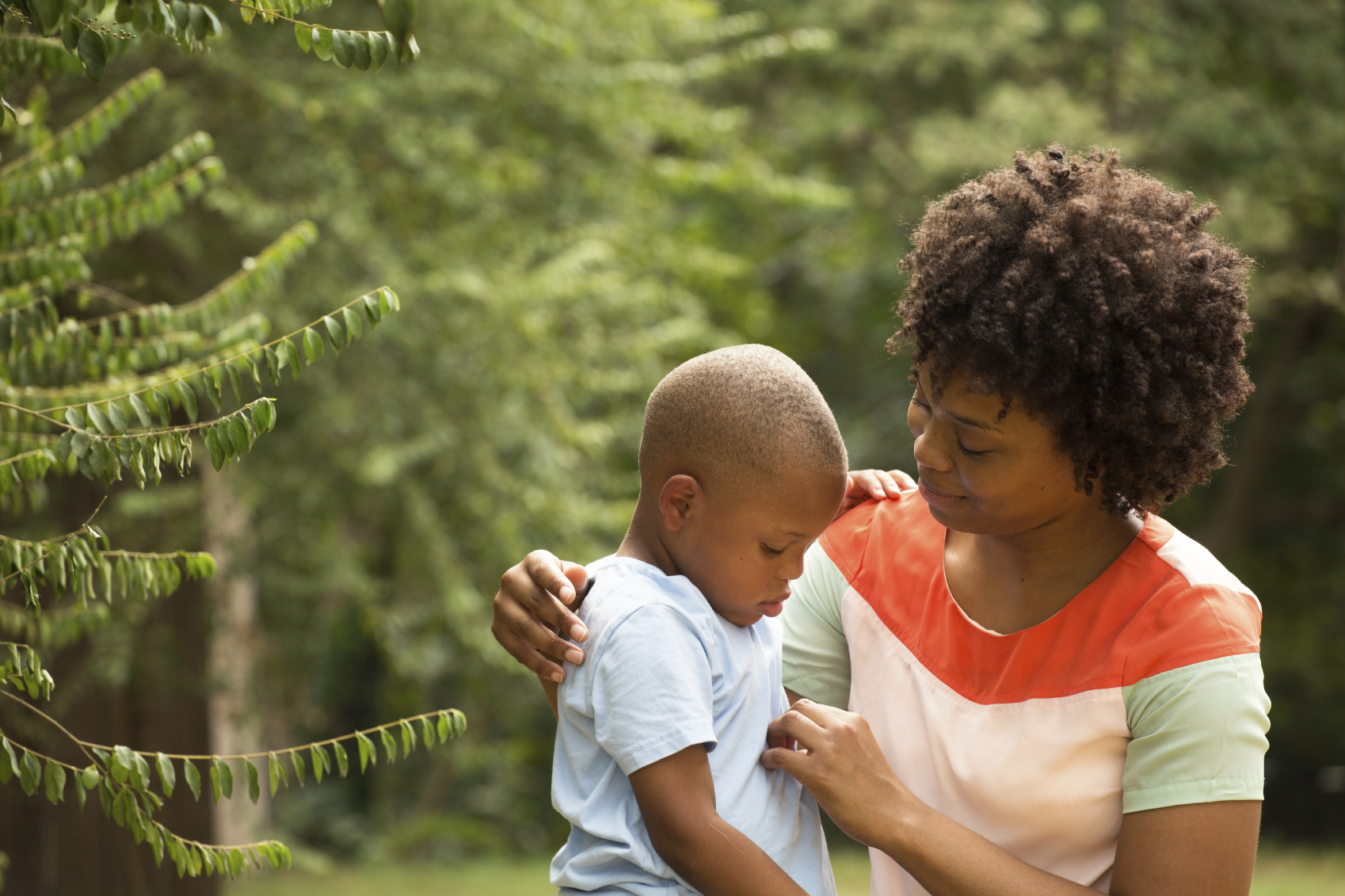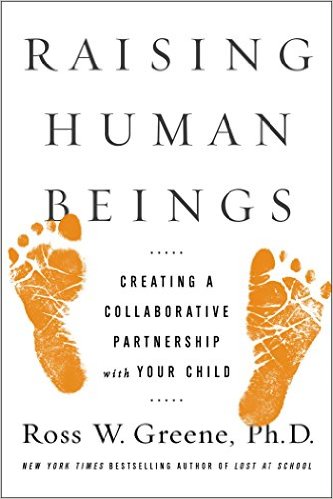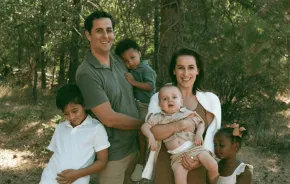
All parents seek discpline strategies that work and they don't lack for options: timeouts, rewards, punishment. Often, however, one method will work only to grow less effective over time. What can a frustrated parent do?
That's much of what Dr. Ross Greene addresses in his work. Author of The Explosive Child, Lost at School and the upcoming Raising Human Beings (out this August), Greene developed the Collaborative & Proactive Solutions approach (CPS).
If kids can do well, they will but if they can't, behavior problems occur, says Greene. To address those probems, he recommends adults empathize with children's difficulties and find collaborative ways of solving problems.
The CPS framework encourages gathering information from the child and involving the child in solving the problem (referred to as Plan B) and prioritizing problems and focusing on one at a time (Plan C). Greene contrasts these approaches with the more common Plan A, the adult developing and imposing a solution to a problem.
Learn more in the Q&A below.
Traditional wisdom says that behavior is shaped by its consequences. At what point in your career as a psychologist did you realize that this approach doesn’t work for children with challenging behaviors?
Behavior is shaped by consequences, but consequences aren’t the only thing affecting behavior nor the only option when it comes to the focal point of treatment. With regard to the latter, it depends on your definition of the word 'work.' The research shows that consequences can work in improving a child’s behavior but also that there are problems associated with that approach. The effects often don’t last once the treatment is removed. That’s a big problem.
Lots of people drop out of treatment. It doesn’t seem to be as effective for older and more aggressive kids. So, while people who are devoted to this model point out that it works, we can’t ignore the data telling us about the meaningful percentage of kids and families for whom it didn’t work.
You do workshops where you give comprehensive explanation and demonstration of how the CPS model works. What’s your elevator pitch?
I have two sound bites. The first one is related to why challenging kids are challenging. All human beings exhibit challenging behavior when the expectations being placed on them outstrip their skills. The second one is that it’s impossible to solve a problem without information from, input from and involvement from the child whose life is affected by the problem.
I’m willing to be as creative as I need to be to find ways to communicate with a kid ... You never throw in the towel with kids.
What is the most common misconception about your approach?
People think they’re giving in and no longer having any expectations for the child.
Speaking of expectations, parents often believe they have reasonable expectations for their children. That makes it hard to come to terms when their child is not meeting them. Can you talk about this?
Because the major theme of the CPS model is 'kids do well if they can,' I don’t worry much about a kid not meeting an expectation that he or she can’t meet. If they can meet it, they meet it. I worry more about pushing hard on an expectation the kids can’t meet.
I often see conflict occurring when we’re pushing on an expectation the kid can’t meet reliably. If a kid meets the expectation 90 percent of the time but doesn’t meet it 10 percent and it results in major challenging behavior, it’s still a problem.
How do you follow Plan B if a child is not engaging in conversation? At what point do you throw in the towel?
I’m willing to be as creative as I need to be to find ways to communicate with a kid and be patient to figure out what makes it difficult for him. You never throw in the towel with kids.
Can you think of a situation when it is okay for the parent to impose a solution to the problem without involving the child, aka use Plan A?
I don’t have an easy time coming up with an unmet expectation that one would try to solve by imposing an adult solution. Even emergent safety issues do not have to be dealt with in this way. In other words, if a kid is already in the midst of a challenging episode, the best strategy is to defuse and de-escalate. If a kid is at the precipice of an explosion, often talking her down is a better approach than applying force.
Plan A is not the same thing as having an expectation. An expectation is an expectation. Plan A is when you’re imposing a solution to an expectation a kid has difficulty meeting.
If two kids are fighting on the playground and you separate them, that’s fine. But have you solved the problem that caused the fight? No. All you’ve done is prevented them from continuing to fight at that moment on that day.
If you look at the examples of imposed solutions, you’ll see that suspensions don’t work, detentions don’t work and hitting a kid on a butt with a piece of wood doesn’t work. And what I mean by 'doesn’t work' is that it does not solve the problem that is causing the behavior in the first place.

What is the most common mistake people make when they use CPS?
There are many people for whom solving problems collaboratively is difficult, at least early on. Because many adults are accustomed to simply imposing their solutions, it can be very hard to break this habit.
Parents tend to worry about their children’s future, particularly when they have difficulty meeting expectations. What can you tell those parents?
Well, if you took a look at any 6-year-old, that 6-year-old is not meeting the vast majority of expectations we’ll have for the kid when she goes to college. Development is an incremental process. And the bottom line is if we want to help a kid to be successful when she goes to college, we need to help her meet the expectations that are appropriate for her along the way.
If we’re helping the kid solve the problems that are getting in her way now and at every point of her development, then I’m pretty optimistic about how she’s going to do when she gets to college.
CPS has also been researched and practiced in Australia, Canada, Denmark and Sweden. Are there any cultural differences in the way parents solve problems in these countries?
All cultures have expectation for kids. Obviously, it’s all individualized. You’re going to find people in every culture who are imposing solutions, though I find that Sweden and Denmark are a little less inclined in that direction. The United States and Australia are similar in their general enthusiasm for imposing solutions, and I would say Canada is somewhere in the middle.
You use CPS with your own children. Why should other parents?
People have been telling me for a very long time that this is the way you should treat any kid. I’ve been talking about it fairly recently in my book, Raising Human Beings. That book is for parents of all children.
Using power to have a child to meet expectation isn’t ideal whether he has challenging behaviors or not. You can get away with imposing solutions with a typical kid, at least early on. You can’t get away with imposing solutions with a child with challenging behaviors because he is going to hit you. Just because a typical kid isn’t going to hit you it doesn’t mean that imposing solutions is a good idea.
Power doesn’t enhance relationships. Power doesn’t enhance communication. Power doesn’t solve problems durably. So we really have no choice but to collaborate with our kids.











